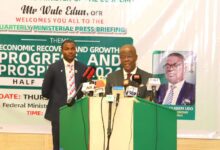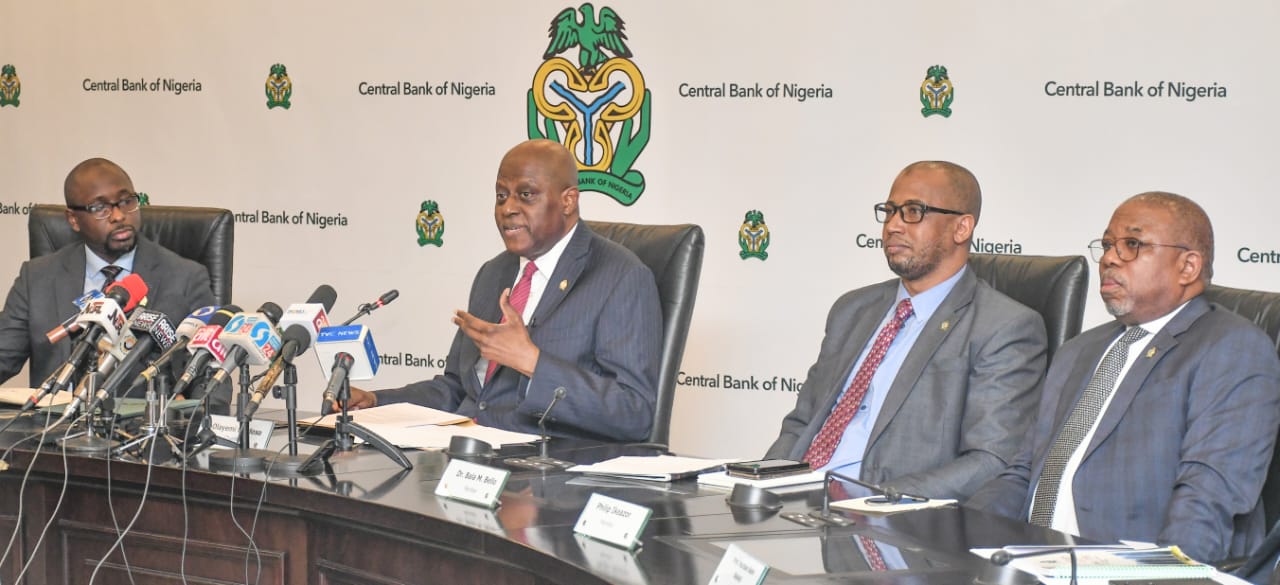Why We Raise Benchmark Interest Rate To 14% -Emefiele

Members of the Monetary Policy Committee (MPC) of the Central Bank of Nigeria (CBN) have unanimously voted to raise the Benchmark interest rate by 100 basis points from 13.0 per cent to 14.0 per cent.
CBN Governor, Mr Godwin Emefiele disclosed this while briefing newsmen shortly after the MPC meeting on Tuesday, July 19, 2022 in Lagos.
It shoul be noted that the 14 percent rate increase would reflect in the cost of borrowing money in different banks or markets.
With this rate, banks would be lending money to an individual or company at the 14 percent benchmark rate plus 2 percent -meaning that the company would pay interest of 2% more than the current benchmark rate of 14 percent.
Rising from the MPC meeting in Lagos, Emefiele who is also the Chairman of the Committee, disclosed that the Committee voted to increase the Monetary Policy Rate (MPR) from 13.0 to 14.0 per cent; Retain the asymmetric corridor at +100/-700 basis points around the MPR; Retain the Cash Reserve Ratio (CRR) at 27.5 per cent; and Retain the Liquidity Ratio at 30 per cent.
Emefiele said, “one member voted to increase the MPR by 150 basis points, six members by 100 basis points, one member by 75 basis points and three members by 50 basis points. Consequently, the Committee resolved to increase the MPR by 100 basis points from 13.0 per cent to 14.0 per cent”.
Rolling out the economic indices that informed the Committee’s decision, the apex bank boss said, “the MPC noted with concern the continued aggressive movement in inflation, even after the rate hike at its last meeting, and expressed its unrelenting resolve to restore price stability while providing the necessary support to strengthen the fragile recovery.
“As regards the decision as to whether to tighten, loose or hold, Members were unanimous and so did not consider both loosening and retaining rates at existing levels at this meeting. This is because on loosening, the MPC felt it could worsen the existing liquidity condition in the economy and further dampen money market rate, necessary to stimulate savings and investment.
“Members also felt that loosening would trigger the weakening of the exchange rate which could pass through to domestic prices.
“The MPC did not also consider retaining the policy rate because a hold stance may suggest that the Bank is not responding sufficiently, to both the global and domestic price development, as inflation numbers continue to trend aggressively upwards.
“As regards tightening policy stance, Members were unanimous that given the aggressive increase in inflation, coupled with the resultant negative consequences, particularly on the purchasing power of the poor, as well as retarding growth, there is the need to continue to tighten. However, the policy dilemma was hinged around the level of tightening needed to rein-in inflation, without dampening manufacturing output, which could result from the higher cost of borrowing.
“Aside from narrowing the negative real interest rate gap, Members were also of the view that tightening would signal a strong determination of the Bank to aggressively address its price stability mandate and portray the MPC’s sensitivity to the impact of inflation on vulnerable households and the need to improve their disposable income.
“Members also noted that the 150 basis points hike by the Committee in May 2022, had not permeated enough in the economy to halt the rising trend in inflation and noted that the month-on-month percentage point increase in headline inflation rose sharply in June 2022 compared with May 2022.
“The MPC also noted that other complementary administrative measures deployed by the Bank to address the growth in money supply did not moderate the inflationary trend.
“Addressing the balance of policy objectives and developments in the global and domestic environment, the Committee resolved that the most rational policy option would be to further strengthen its tightening stance in order to effectively curtail the unabated rising trend of inflation.
“Members were conscious of the fact that output growth remained fragile, however, not curtailing inflation now could erode the moderate gains achieved in improving consumer purchasing power and thus worsen poverty level for the vulnerable populace.
“To ensure that output still remains in focus, the MPC advised the Bank’s Management to continue to use its development finance tools to support the agricultural and manufacturing sectors. The Committee thus voted unanimously to raise the Monetary Policy Rate (MPR)”, Emefiele said.






